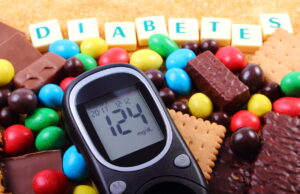How Does Diabetes Change Seniors’ Eating Habits?
Diabetes is a metabolism disorder that affects the way the body processes blood sugar, or glucose. In people with diabetes, the pancreas either doesn’t produce enough insulin, or their cells don’t respond appropriately to the insulin produced. This causes too much glucose to be released into the blood, which can be balanced with insulin doses and closely monitored carbs. By the year 2025, two thirds of seniors age 60 and over will be diabetic patients. Seniors with diabetes are more likely to have other chronic conditions like hypertension or cardiovascular disease which will evidently impact their nutritional requirements. Maintaining an optimal body weight at older age is a paramount criteria for which dietary restrictions are to be followed for seniors.
Diabetic Diet:

Personal Care at Home in Rockford, MI: Diabetes and Eating Habits
As per the American Diabetes Association (ADA) there is no silver bullet to treat diabetes through one’s diet. Many foods can be beneficial for diabetes as long as they include non starchy vegetables in bulk and limit the sugar and refined carb intake that many diet plans focus on. Unprocessed food is always a good choice to base a diet off of.
Plates of your choice:
There are many tasty diabetic friendly meals available if you are aware. Below are some recommended choice:
- Vegetables: Leafy greens such as collards, spinach, and kale are full of vitamins and minerals, and they’re low in calories and carbs. Broccoli has only 27 calories per half cup serving and is full of nutrients such as vitamin C and magnesium. Summer squash contains antioxidants and fiber that may help stabilize blood sugar and insulin levels. Arugula, lettuce, and celery have high nitrate concentrations. Carrots, beets, Brussels sprouts, and avocado are all high-fiber veggies.
- Fruits: Citrus fruits such as oranges, grapefruit, clementine, and lemon are high in fiber, vitamin C, folate, and potassium. Berries such as blueberries, strawberries, and blackberries are all packed with antioxidants, vitamins, and fiber. Tomatoes contain vital nutrients like vitamin C, vitamin E, and potassium.
- Proteins: Fatty fish such as salmon, mackerel, trout, and tuna are packed with omega-3 fatty acids, which may help reduce the risk of heart disease and inflammation. Lean poultry such as skinless chicken is versatile, flavorful, and healthy. Try replacing hamburger meat with ground turkey for favorites like burgers and meatloaf.
Adverse effect of dietary restrictions:
Diet is key to controlling diabetes but, as an added challenge, older adults frequently suffer from a loss of appetite as their ability to taste and smell diminishes. In addition, their energy and activity levels drop, and depression may become a factor. So having a professional around like personal care at home in these cases is an added advantage to encourage your senior to eat and get proper nutrition.
Conclusion: How Does Diabetes Change Seniors’ Eating Habits?
If your senior is having a hard time preparing healthy meals, or if you as a caregiver are struggling to meet his or her nutritional needs, it may be time to think about personal care at home options. Call us today to review your options!
If you or someone you know needs help with Personal Care at Home in Rockford, MI, contact Gauthier Family Home Care. We provide quality and affordable home care services in our community. Call us at (616) 258-2300 for more information.
Sources:
https://www.researchgate.net/publication/223797950_Nutritional_challenges_in_the_elderly_with_diabetes
https://www.ncbi.nlm.nih.gov/pmc/articles/PMC4522893/
https://www.sciencedirect.com/science/article/pii/S1877593409000162
- Ensuring a Smooth Transition From Hospital to Home - June 4, 2025
- Caregiver of the Month – June 2025 - June 2, 2025
- Common Sense Summer Tips for Seniors to Help Them Beat the Heat - May 28, 2025

